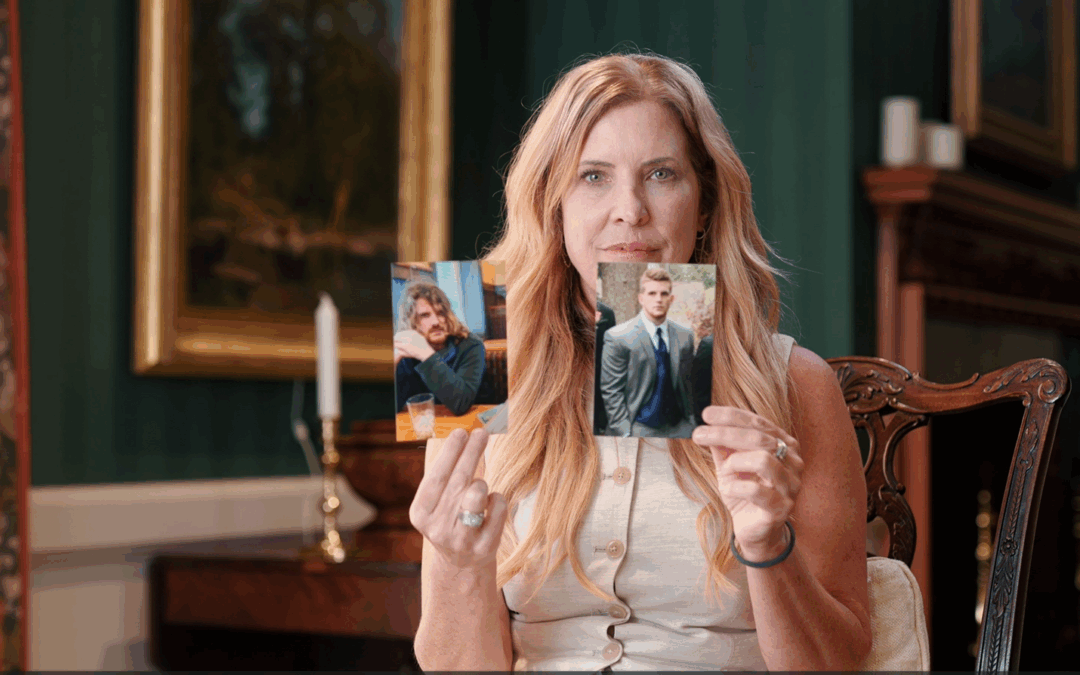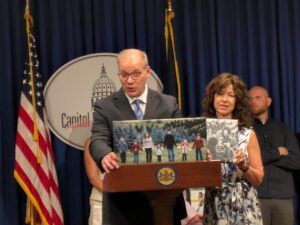When Jennifer looks at her son today, she sees both a young man she loves deeply and a life that has been tragically altered. She has spent the last decade navigating a nightmare she never imagined when her son first experimented with marijuana as a teenager.
“I mourn my husband, who passed suddenly—and I mourn my son too,” she says quietly. “The boy I once knew is gone. What’s left is someone entirely different.”
A “Normal” Childhood Interrupted
Jennifer’s firstborn was, by every account, he was bright, funny, and full of potential.
“He could locate any country on a map when he was four years old and tell you what currency each country used,” Jennifer remembers. “He was the only sophomore on the varsity football team. He was a captain, a leader, a writer, and volunteered with me in my classroom. Just a great kid.”
But when her oldest was 14, he began using marijuana socially. At first, Jennifer and her husband thought it was something they could discourage and manage. “It didn’t seem to be impacting him much at all,” she recalls.
That changed dramatically after tragedy struck.
“When his father died suddenly, he was overwhelmed by grief. We went to the doctor, and the doctor suggested getting him a medical marijuana card. I helped him, thinking it would be safer than street marijuana. That decision will haunt me forever.”
A Rapid Descent into Mental Illness
Once Jennifer’s son had legal access to high-potency marijuana products, his life—and his family’s—spiraled.
“He became paranoid, delusional, manic. He thought the Taliban was after him. He once tried to jump out of my car while it was moving because he thought everyone was listening to him,” Jennifer says.
Since then, he has been hospitalized 13 times, jailed three times, and is now diagnosed with schizophrenia and bipolar disorder—conditions that have no history in the family.
“He’s been sober for a year and a half, but he’s not himself. He has to be asked to brush his teeth, to shower. He can’t work. Where he was once an asset to society, he is now a burden.”
The emotional toll has been immense. Jennifer and her two other sons are in therapy, learning how to cope with what she calls “this new version of him.”
The Addiction No One Wanted to See
For years, Jennifer says she believed marijuana wasn’t addictive. “That’s what I grew up hearing,” she admits. But her son’s struggle has convinced her otherwise.
“When he had to stop using, I watched his body go through withdrawal. He was irritable, withdrawn, pulling his hair out. He was miserable. It took 30 days for him to come back to us each time he stopped. He was addicted.”
The claim that marijuana is “harmless” enrages her. “My son will probably need care for the rest of his life—all because of THC. His brain has been hijacked.”
A Direct Plea to Pennsylvania Lawmakers
“THC is harmful and should not be legalized. I’ve seen it in my own family, and I’ve found other families just like mine.”
~ Jennifer
With Senate Bill 120 pushing for full legalization of recreational marijuana in Pennsylvania, Jennifer has a message for legislators:
“My message to PA legislators is that THC is harmful and should not be legalized. I’ve seen it in my own family, and I’ve found other families just like mine. Marijuana is hijacking our kids’ brains, making them dependent on the state, costing taxpayers money.”
She points out that the industry markets directly to children with candy-like packaging and colorful branding. “Kids don’t read the warnings. They eat a whole gummy and end up in the hospital—or worse.”
She warns that legalizing high-potency marijuana will only make the crisis worse. “Everyone competes to make it stronger. And the best customers are children. That’s who this is really targeting.”
“It Changed My Son—and It Will Change Our State”
Holding up two pictures—one before marijuana, and one after years of psychosis—Jennifer summarizes her story with painful clarity:
“I believe marijuana is extremely bad because it’s changed who my son is, possibly forever. It’s changed our family. And it will change our state, because of the money going out for kids like mine—courts, jails, hospitals, therapy, medication. He is no longer the boy I raised. He is no longer an asset to our society.”
Why Pennsylvania Must Say No to SB120
Jennifer’s story is not isolated. Families across the Commonwealth are grappling with the fallout of high-potency marijuana use.
As the New York Times recently reported, cannabis-related calls to poison control have surged from about 930 cases in 2009 to more than 22,000 in 2024, with over 75% involving children or teens. As the story documents, children and teens are being poisoned by these high-potency marijuana products. “As products like weed gummies proliferate, more children and teens are suffering symptoms including seizures and life‑threatening breathing problems.”
Here in Pennsylvania, SB120 would:
- Strip communities of control over whether pot shops open nearby.
- Put the Liquor Control Board in charge of licensing and advertising a new predatory industry.
- Legalize unlimited-potency THC concentrates—linked to addiction and psychosis.
- Allow homegrow operations with vague oversight.
Where marijuana has been legalized, the results are devastating: more children hospitalized after THC exposure, rising rates of youth addiction and psychosis, increased drug-impaired traffic fatalities, and thriving black markets.
The data and Jennifer’s testimony make clear: Pennsylvania cannot afford to follow that failed path.
Take Action: Oppose SB120
State officials should not be incentivized by addiction. Families like Jennifer’s are paying the price—and so is our future.
Tell your Senators and Representatives to oppose SB120 and stop the legalization of dangerous high-potency marijuana in Pennsylvania.




Legalizing marijuana poses many significant harms. Here are the main concerns.
Health Risks
• Mental health: Frequent use, especially in adolescents and young adults, has been linked to increased risk of anxiety, depression, psychosis, and schizophrenia in genetically vulnerable individuals.
• Cognitive effects: Heavy use can impair memory, learning, attention, and decision-making, particularly when use begins at a young age.
• Addiction: While less addictive than substances like nicotine or opioids, about 1 in 10 users develop cannabis use disorder (higher for those who start young).
• Respiratory issues: Smoking marijuana can irritate the lungs, leading to chronic bronchitis and other breathing problems (though less than tobacco).
Public Safety
• Impaired driving: Marijuana can slow reaction times and impair coordination, increasing accident risk. Legalization may contribute to more impaired-driving incidents if not strictly regulated.
• Workplace safety: Employees in jobs that require focus or operating machinery may pose safety risks if impaired on the job.
Social Concerns
• Youth access: Even with age restrictions, legalization may normalize marijuana use and increase access for teens, whose brains are more vulnerable to long-term effects.
• Gateway effect: Though debated, some argue marijuana use may increase the likelihood of experimenting with harder drugs.
• Public health burden: More users could mean more people needing treatment for cannabis use disorder, and more costs related to health and safety.
Jen was recently arrested for driving under the influence and ended up losing her license. She is not the best person to be representative of your organization. All of the information is easily found on the Montgomery County Courts web page.